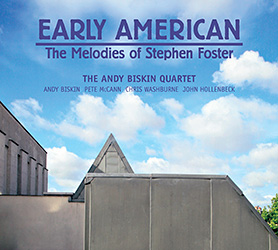Recordings
Early American: The Melodies of Stephen Foster
Early American: The Melodies of Stephen Foster
Andy Biskin Quartet
Mixing mania and melancholy in a rather uncanny way, the clarinet player brings a new vibe to Stephen Foster's nuggets on the recent Early American. A gleeful modernist, his arrangements have no problem giving the material a hotfoot while still allowing their melodies and sentiment to radiate. —Jim Macnie, The Village Voice
This CD features songs by Stephen Foster, as well as six Biskin originals. Although Biskin takes liberties with Foster's tunes, he preserves the beauty and sentiment of the songs while casting them in a new light. Biskin's own pieces for the quartet are equally melodious and varied in form, uniting elements from early and modern jazz with dance and classical music. The quartet features some of New York's most searching and genre-defying musicians, including John Hollenbeck (percussion), Pete McCann (guitar/banjo), and Chris Washburne (trombone/tuba).
—Read more Early American: The Melodies of Stephen Foster press clips here.“Early American: The Melodies of Stephen Foster” Liner Notes
Early American: The Melodies of Stephen Foster
“Old songs, new songs, ev’ry kind of song. I noted them down as I read them along.”
–from The Song of All Songs by Stephen Foster (1826–1864)
A few years ago I had a regular duo gig with my old friend, the pianist Joe Kerr, at a private restaurant run by a fancy New York health club. On slow nights we’d flip through the songbooks Joe carried around in his bag and read through whatever we came across, the odder the better. Instead of the usual standards, we’d play Mancini, Mozart, Floyd Cramer, Victor Herbert, Bob Wills, and finish off with “Amazing Grace.”
One evening we stumbled on “Jeanie with the Light Brown Hair.” I can’t say that when we finished our rendition there was a reverent hush in the room, or even polite applause, but Joe and I were duly moved. Like a painting by an old master, the song felt like a self-contained world in miniature, perfect and timeless.
Around that same time I’d formed a band with clarinet, guitar, tuba and percussion. We’d been playing my own compositions, but I decided to try making an arrangement of “Jeanie,” and when I finished it, I felt that I had discovered a new way of writing for the group. Over the next couple of years I arranged more Stephen Foster tunes and in each one I found something that grabbed me. Mostly it was in the shape of the melodies, how they unfolded so naturally, like a good story.
As i continued to write for the quartet I never thought about composing in a “Foster style” or transforming his tunes into my own style. But gradually the two halves of our songbook started to intertwine. Today our repertory consists of about two dozen originals and almost a dozen Fosters. When we perform we alternate between the two, and somehow they seem to complement each other.
The first and last tracks on this album are recordings of a wind-up music box from the late 1800s that used 17-inch disks cut from tin to play the music of the day. Through sheet music, live performances, player piano rolls, and mechanical devices like this one, Foster’s songs almost instantly found their way into the nation’s collective culture. It’s amazing to think that within a few years of their publication—and without radio or recordings—just about every American knew these songs by heart.
Ironically, this same public knew almost nothing about Foster’s sad life: he died an alcoholic at the age of 37—alone, broke and depressed. His last published song was “Beautiful Dreamer,” but he left behind sketches for many others. On a scrap of paper found in his pocket when he died he had written the phrase “dear friends and gentle hearts.”
During Foster’s lifetime people were already assuming that “Oh! Susanna” and “Old Folks at Home” were folk songs that had been passed down through the ages. A century and a half later, perhaps the melodies have aged better than the lyrics. Nevertheless, that Foster’s tunes continue to inspire and delight us speaks to their true worth.
— Andy Biskin
